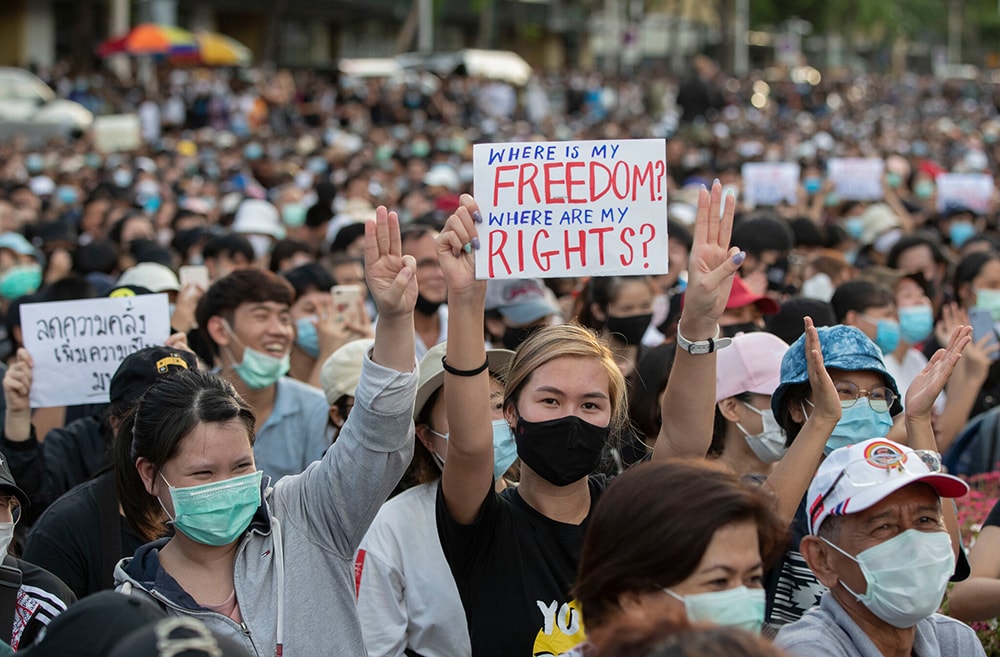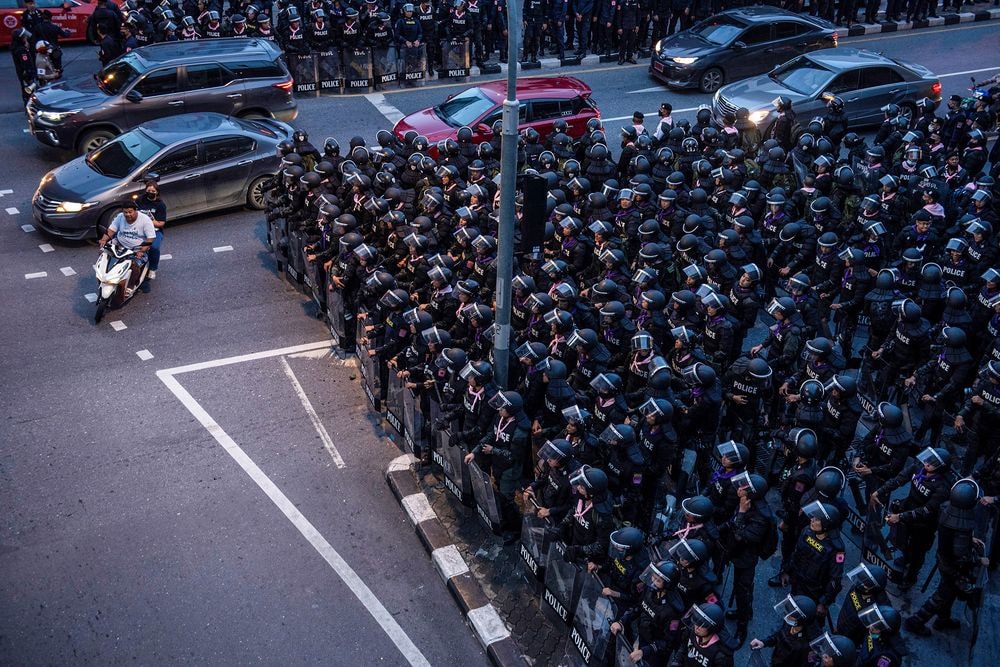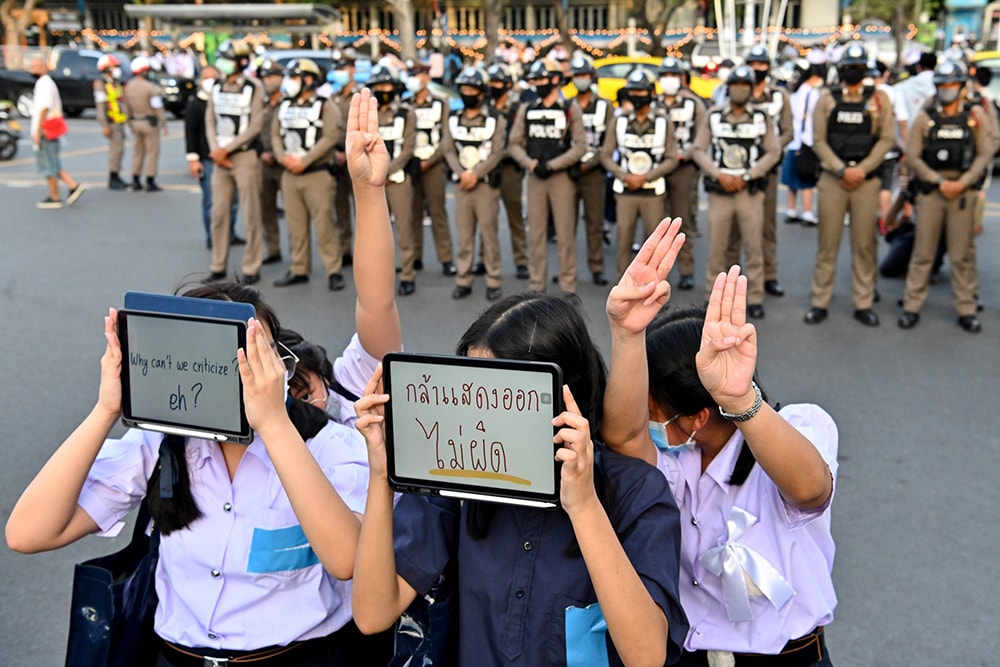Thai politics is not easy to overcome the crisis.
(Baonghean.vn) - Thousands of people have been protesting in Bangkok since July, calling for royal reforms to reduce the king's power, demanding the Prime Minister's resignation, constitutional reform and elections. This wave will only end when the demands are compromised, but it will not be easy, because the Government has shown no signs of concession.
Explosion when pent-up resentment
Public discussion aboutmonarchyInsulting senior members of the royal family has long been taboo in Thailand, and insulting senior members of the royal family can be punishable by up to 15 years in prison. But unlike previous mass protests that have led to crackdowns or coups, this one is aimed squarely at the royal family.
This time, the political system in Thailand faces a bigger problem: The student-led protest movement is not demanding power, but instead wants to fundamentally change the political system, which has seen about 20 military coups since 1932. The student class has broken long-standing taboos, not afraid to criticize the monarchy - the fundamental force that holds the current system in place.
 |
| Thousands of people joined the pro-democracy protests in Thailand. Photo: Getty |
Despite the government's emergency ban on mass gatherings and threats of crackdown, thousands of protesters filled busy intersections in Bangkok and were determined to continue their demonstrations.
The government could take more drastic steps to stop the protests, raising fears of a brutal military crackdown similar to what Thailand saw in 1973, 1976, 1992 and 2010, especially when royalist groups confronted pro-democracy protesters. But even with a strong crackdown on the streets, the authorities still need to come up with a more radical solution, such as shutting down discussion of the monarchy on social media and addressing the issues of inequality, corruption and abuse of power that started the protests.
The protests have gained momentum amid sluggish growth, exacerbated by the pandemic, which has plunged the Thai economy into its worst-ever slump, with two key drivers derailed: tourism and trade.
It is worth noting that the economic difficulties have posed a bigger problem, which isthe rich-poor divideprofound. The World Bank said in March that the number of Thais living in poverty has increased in recent years. While a study published last year by the Bank of Thailand Research Institute found that about 36% of corporate ownership is concentrated in the hands of just 500 people.
 |
| Thai people protest for democracy and justice. Photo: AFP |
As a result, the royal family’s wealth and extravagance in particular have become a source of anger. Protesters are demanding tighter controls on the royal assets, which include large properties in central Bangkok and stakes in Thailand’s largest publicly traded companies. Protesters have also increased scrutiny of public funds used for the king’s life.King Maha VajiralongkornHe ascended the throne four years ago, ruled the country from Europe, spent lavishly and gave unqualified support to the prime minister, leaving people disappointed.
Young people in particular are involved in the protest movement because they see no viable economic future and have become genuinely discontented with the way the country is run by a Cold War-style political system that gives a lot of power to the military, the monarchy, the judiciary.
“If you ask who is supporting them, then discontent is the driving force. To end these discontents requires some concessions, changes and reforms. However, we do not see that, but only the opposite.”
No sign of concession
Although the protesters are not supported by any specific political group, the pro-democracy faction in Parliament has condemned the moves to suppress the protesters. Pheu Thai, the largest opposition party, has called on the government to immediately lift the state of emergency and release those arrested. Another opposition group has also planned to bail out detained protesters.
 |
| Police forces participate in anti-riot in Bangkok. Photo: Getty |
Not only that, opposition groups in Thailand are also trying to rewrite the Constitution - one of the protesters' main demands, along with the demand for Prime Minister Prayuth to resign, and a series of changes to the monarchy to require this regime to be more responsible to the 69 million Thai people.
The government has said it is open to some changes to the constitution, drafted by a military-appointed panel, to help Mr Prayuth stay in power after last year's election. But the majority coalitionPrime Minister Prayuthhas delayed the promise. Analysts say the move has a long history of blocking reform efforts aimed at empowering elected leaders, and are skeptical that the government will again delay until the current wave of anger subsides.
“The government may use the promise of constitutional amendments and referendums as a way to buy time, until protesters are discouraged. When in reality, it will make little, if any, change.”
In addition, Prime Minister Prayuth himself has insisted that he will not resign, and will lift the emergency decree before it expires in 30 days “if the situation improves.” Prayuth has also avoided directly addressing demands related to the monarchy, including preventing the king from endorsing any coups and revoking laws prohibiting insults to the monarchy. Government officials have also criticized the protest movement, calling their actions “disrespectful to the monarchy” and demanding that they be stopped.
 |
| Young female students face police, holding up banners and protest symbols. Photo: Bloomberg |
The wave of protests in Thailand is starting to attract global attention. The issue of King Maha Vajiralongkorn's foreign residence is at the center of attention. The student-led protest movement since July has frequently criticized or satirized the fact that the head of the royal family still runs the country, despite living in Germany. German Foreign Minister Heiko Maas recently spoke out that King Maha Vajiralongkorn should not conduct political activities from the European country where he spends most of his time.
Many Thai political experts believe that Prime Minister Prayuth’s government has not shown any willingness to compromise, and it is inevitable that clashes will continue in the coming time. The government may think that arresting a few people, detaining or even removing some leaders is enough. But this does not seem to be the case with this wave of protests. The image of 15-year-old schoolgirls, wearing uniforms, climbing out of barricades to stand in front of the police - that is a scene never seen before in Thailand./.

